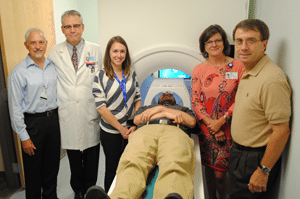Researchers Welcome Mock MRI from Translational Research Institute
Sept. 6, 2012 | An MRI simulator purchased by the Translational Research Institute in collaboration with the Psychiatric Research Institute has been welcomed as an essential new tool for the University of Arkansas for Medical Sciences (UAMS) Brain Imaging Research Center. At a recent demonstration of the mock MRI, Clint Kilts, Ph.D., director of the Brain Imaging Research Center, told institute leaders and others that the simulator will save valuable time on the center’s Philips Achieva 3 Tesla MRI. By providing time to familiarize research participants with an MRI’s confined space and sounds and to coach techniques for remaining still, researchers will streamline data collection and improve data quality. The $30,000 simulator, acquired through the UAMS Translational Research Institute’s Strategic Investment program, is especially valuable for studies that involve children and adults who may be claustrophobic or intimidated by the device. Curtis Lowery, M.D., director of the Translational Research Institute, said the MRI simulator purchase goes to the heart of the institute’s mission. “Efficiency in research is a national priority, and it’s our priority,” he said. “We are excited about this investment because use of the mock MRI means more efficient use of the actual MRI. We are also excited about the center’s promising translational research, which has the potential to provide significant benefits to the public in the form of improved mental health.” The Translational Research Institute is funded by a National Institutes of Health (NIH) Clinical and Translational Science Award (CTSA), with significant support from UAMS. As one of 60 CTSAs nationally, its purpose is to help UAMS researchers speed knowledge and discoveries toward improved health and health care for Arkansas and the nation. Lisa Jackson, J.D., R.N., executive director of the Translational Research Institute, noted that as a CTSA recipient, the institute is also expected to help foster collaborative research projects across science disciplines and between research institutions. The MRI simulator supports this effort. UAMS researchers with the Injury Prevention Center at Arkansas Children’s Hospital will use the simulator in a new study of traumatic brain injury in children that will be conducted in partnership with the Baylor College of Medicine. “We are extremely grateful to the Translational Research Institute, whose support for the Brain Imaging Research Center extends beyond this purchase,” Kilts said, noting that one of his researchers, George Andrew James, Ph.D., is receiving salary support through the institute’s KL2 Scholar Career Development Award, which is supported by the NIH and the UAMS College of Medicine. Another Brain Imaging Research Center researcher, Josh Cisler, Ph.D., received a $20,000 Translational Research Institute investment. The funding allowed him to compile data needed to win a $405,000 National Institutes of Health (NIH) grant for a study that could lead to improved treatments for abused adolescent girls. The MRI simulator will play a key role in his research. “Because Dr. Cisler’s study involves psychologically fragile adolescents, we want to be sure they are completely comfortable with an MRI,” Kilts said. “The MRI simulator will make it possible to take the time these girls need and ensure that we conduct a quality study.” |
